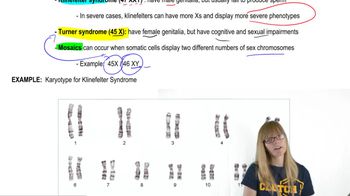Here are the essential concepts you must grasp in order to answer the question correctly.
Sex Chromosomes
Sex chromosomes are a specific pair of chromosomes that determine the sex of an individual. In humans, there are two types: X and Y chromosomes. Females typically have two X chromosomes (XX), while males have one X and one Y chromosome (XY). The presence of the Y chromosome is crucial for male development, while the absence of a Y chromosome leads to female characteristics.
Recommended video:
Y Chromosome and Male Determination
The Y chromosome carries the SRY gene (Sex-determining Region Y), which triggers the development of male characteristics. This gene initiates a cascade of genetic events that lead to the formation of testes, which produce male hormones. Without the Y chromosome and its SRY gene, the default developmental pathway leads to female characteristics, illustrating the Y chromosome's pivotal role in sex determination.
Recommended video:
Genetic Mechanisms of Sex Determination
Genetic mechanisms of sex determination involve the interplay of genes and chromosomes that dictate sexual development. In humans, the presence of the Y chromosome and its associated genes is essential for male differentiation, while the absence of these factors results in female development. Understanding these mechanisms helps clarify how genetic information is translated into physical traits related to sex.
Recommended video:
 Verified step by step guidance
Verified step by step guidance Verified video answer for a similar problem:
Verified video answer for a similar problem:

